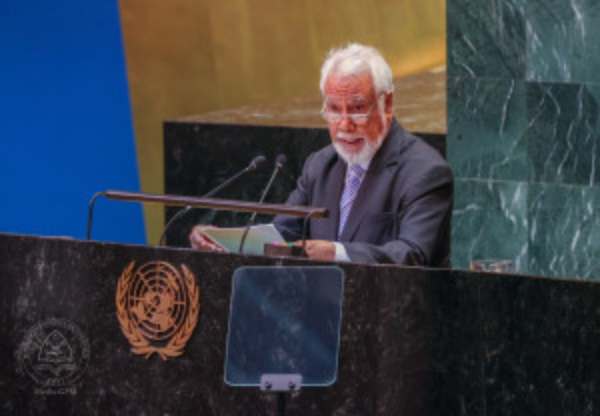(AseanAll) — On September 27th, 2024, Timor-Leste Prime Minister Kay Rala Xanana Gusmão gave a speech during the general debate of the 79th Session of the United Nations General Assembly. In his address, he highlighted the urgent need for reforms in the UN Security Council and the importance of climate finance for vulnerable countries.

In his speech, Xanana Gusmão called for a “more representative” Security Council, emphasising that its decisions “must reflect the collective will of the international community” and not the interests of the “most powerful states”. The Prime Minister argued that the Council should permanently include the voices of Africa, Latin America and Asia, arguing that “the interests of the most powerful should not overshadow the smallest nations”.
During his speech, the Head of Government also emphasised the crucial role of peace and reconciliation, drawing a parallel with Timor-Leste's trajectory. “Reconciliation and trust are the instruments for peace that the world needs”, he said. Xanana Gusmão recalled the process of national independence, which was supported by the UN, and stressed that Timor-Leste is today “a vibrant democracy – one that has welcomed peace, dialogue, human rights and the rule of law”.
Another central theme of the speech was the urgency of concrete action to tackle climate change, with special attention to small island states such as Timor-Leste. “The unequal suffering established by the effects of climate change is among the greatest injustices in this world”, said Xanana Gusmão, emphasising the need for “rich and developed countries” to honour their commitments to the “loss and damage” fund approved at COP28. The Prime Minister reiterated that mitigating the effects of climate change is a priority for his Government, which “is currently focused on diversifying its economy, with a special emphasis on agriculture and the blue economy”, sectors that are essential to “improving the livelihoods of our people and increasing food security”. In this regard, he reaffirmed Timor-Leste's commitment to contribute to sustainable development and protecting its marine resources, referring to the ratification of the Agreement on the Conservation of Marine Biodiversity.
The Prime Minister also highlighted the growing global “social and economic inequalities”, emphasising that “without financial conditions, capacity building and technology transfer”, the most fragile nations will continue to be trapped in cycles of poverty and instability. Xanana Gusmão argued that “peace and stability are the priority for achieving sustainable development” because “without peace, there is no justice, no strong institutions and no development. And without development, peace becomes fragile”.
Regarding international peace and security, Xanana Gusmão expressed his “greatest concern” about ongoing international conflicts, including the Israeli-Palestinian conflict and the war in Ukraine, and called for a peaceful resolution to both. The Head of Government called for “an immediate end to the genocide” and “for the principles of the ‘United Nations Charter’ to be applied, with courage and leadership”. He also called “for more thought to be given to the peoples and people, victims of the policies of countries and leaders, and less to the status quo”.
The Prime Minister also reinforced his support for “a referendum on self-determination for the Saharawi people” and called for an end to the “economic, commercial and financial embargo imposed on Cuba for decades”.
At the end of his speech, Xanana Gusmão emphasised the importance of the United Nations' role in world peace and stability. “With all its weaknesses or need for change, the United Nations is the most promising mechanism we have for overcoming the difficulties of our time”, he said, calling for “all UN states to overcome their differences and act together to consolidate peace and development”.
Kay Rala Xanana Gusmão concluded with a message of hope, stating that “peace is a global mission, development is a global duty” and added that “with perseverance and the will to do good, no matter how difficult it may seem, there are no challenges that are not insurmountable!”.